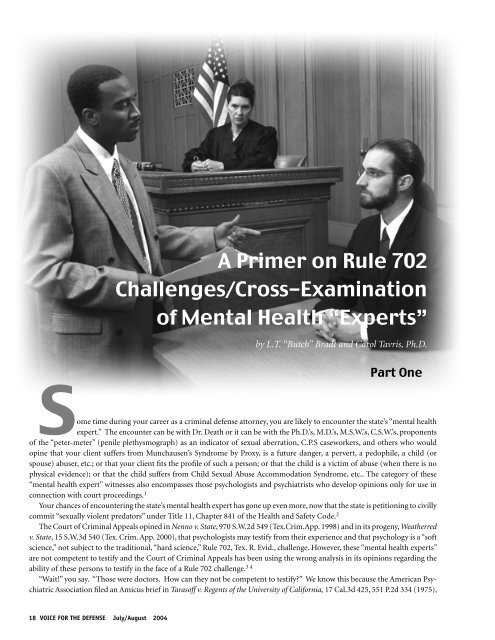July/August 2004 VOICE FOR THE DEFENSE 1
July/August 2004 VOICE FOR THE DEFENSE 1
July/August 2004 VOICE FOR THE DEFENSE 1
You also want an ePaper? Increase the reach of your titles
YUMPU automatically turns print PDFs into web optimized ePapers that Google loves.
A Primer on Rule 702<br />
Challenges/Cross-Examination<br />
of Mental Health “Experts”<br />
by L.T. “Butch” Bradt and Carol Tavris, Ph.D.<br />
Part One<br />
Some time during your career as a criminal defense attorney, you are likely to encounter the state’s “mental health<br />
expert.” The encounter can be with Dr. Death or it can be with the Ph.D.’s, M.D.’s, M.S.W.’s, C.S.W.’s, proponents<br />
of the “peter-meter” (penile plethysmograph) as an indicator of sexual aberration, C.P.S caseworkers, and others who would<br />
opine that your client suffers from Munchausen’s Syndrome by Proxy, is a future danger, a pervert, a pedophile, a child (or<br />
spouse) abuser, etc.; or that your client fits the profile of such a person; or that the child is a victim of abuse (when there is no<br />
physical evidence); or that the child suffers from Child Sexual Abuse Accommodation Syndrome, etc.. The category of these<br />
“mental health expert” witnesses also encompasses those psychologists and psychiatrists who develop opinions only for use in<br />
connection with court proceedings. 1<br />
Your chances of encountering the state’s mental health expert has gone up even more, now that the state is petitioning to civilly<br />
commit “sexually violent predators” under Title 11, Chapter 841 of the Health and Safety Code. 2<br />
The Court of Criminal Appeals opined in Nenno v. State, 970 S.W.2d 549 (Tex.Crim.App. 1998) and in its progeny, Weatherred<br />
v. State, 15 S.W.3d 540 (Tex. Crim. App. 2000), that psychologists may testify from their experience and that psychology is a “soft<br />
science,” not subject to the traditional, “hard science,” Rule 702, Tex. R. Evid., challenge. However, these “mental health experts”<br />
are not competent to testify and the Court of Criminal Appeals has been using the wrong analysis in its opinions regarding the<br />
ability of these persons to testify in the face of a Rule 702 challenge. 3 4<br />
“Wait!” you say. “Those were doctors. How can they not be competent to testify?” We know this because the American Psychiatric<br />
Association filed an Amicus brief in Tarasoff v. Regents of the University of California, 17 Cal.3d 425, 551 P.2d 334 (1975),<br />
18 <strong>VOICE</strong> <strong>FOR</strong> <strong>THE</strong> <strong>DEFENSE</strong> <strong>July</strong>/<strong>August</strong> <strong>2004</strong>

















